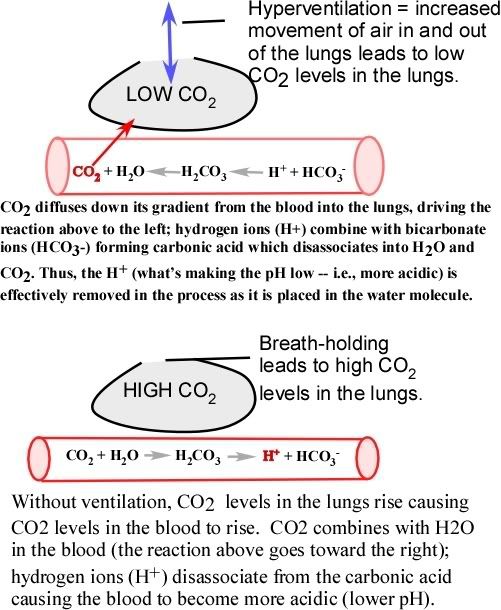PART 3:
Now......the link to global climate change. Recall that hyperventilation prior to a breath-hold will decrease CO2 levels in the blood, which yields fewer reactions between CO2 and H2O and, thus, less carbonic acid production, meaning fewer free H+. And, remember, during the breath-hold CO2 levels in the blood rise (you're not exhaling them), yielding more reactions with water and more acid formation (more H+).

This simple chemical reaction is extremely important in animal physiology, but it is also potentially important in global climate change. Increased atmospheric CO2 levels from the burning of fossil fuels is leading to more CO2 dissolved in the ocean. CO2 will act the same way in ocean water as it does in your blood. It will form an acid. Below I diagram some likely effects of increased atmospheric CO2 on ocean critters and the subsequent effects that may be felt by human populations. As is often the case, poor people in developing countries are likely to feel many effects of ocean acidification first.

Here are some science new releases related to information above:
- Slowed growth of organisms that produce calcium carbonate skeletons (coral, algae, molluscs, etc.) 1, 2
- Acidification seen in US pacific coast
- Reduced reproductive capability of marine species due to acidification.
Life is interconnected on this Earth. What we do each day affects ecosystems around the world (e.g., coral reefs). Thereby, what we do affects the livelihood and nutrition of people on the other side of the earth. Hopefully, what we do will ultimately be beneficial.
When our acids get high in our blood, we feel the need to breathe. We can delay it slightly by hyperventilating. In the end, with the breath we are likely to live, without it we will not. The earth can't hyperventilate....even if it could, it may only buy it a little more time.

1 comment:
This is so interesting. I was just speaking with a diver, who told me how much attention you must pay to gases when you're diving. Fascinating to see this correlation drawn between the human body and the ocean, vis a vis critical pH, fluid chemistry.
Post a Comment